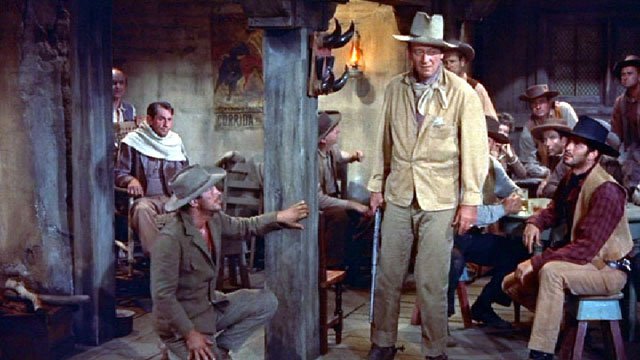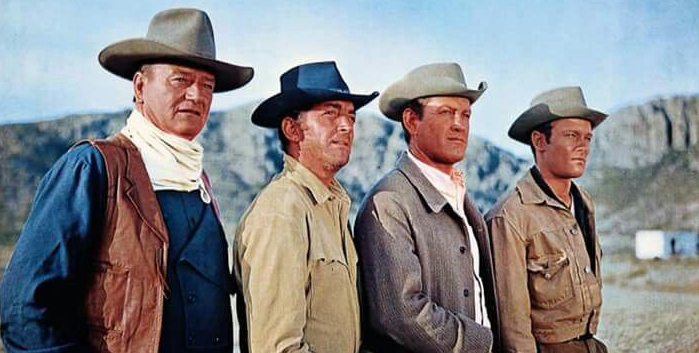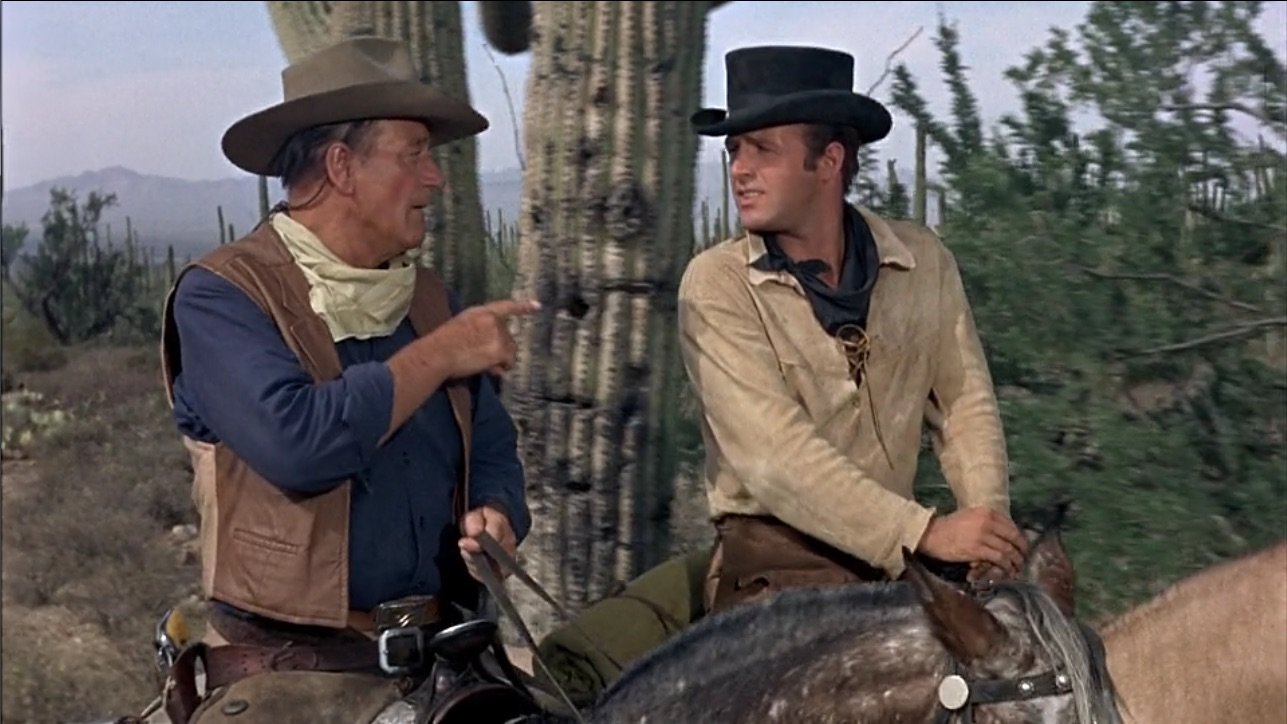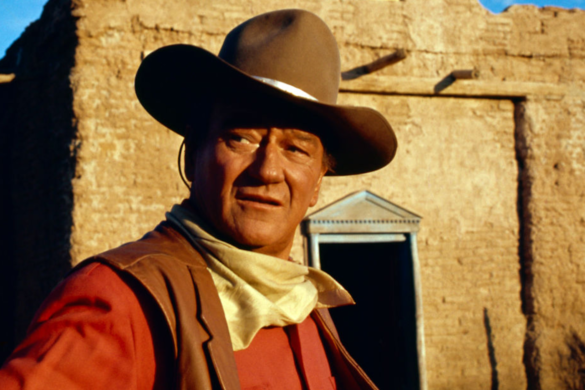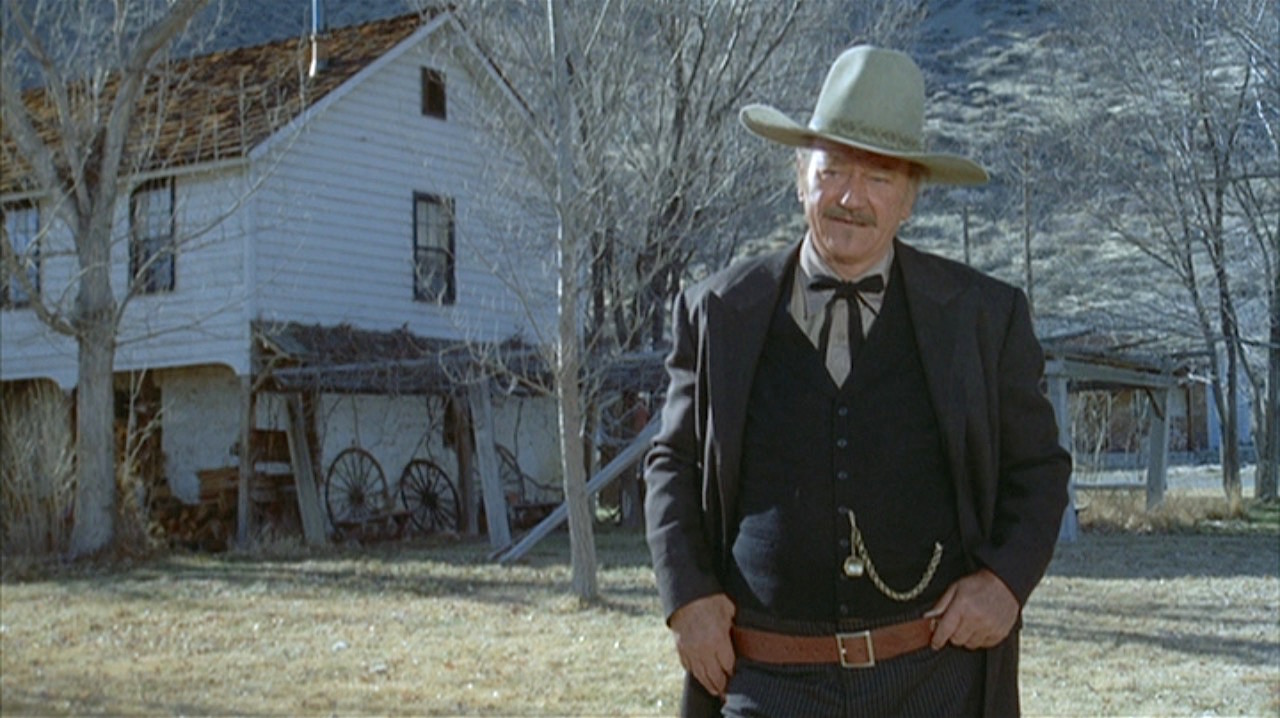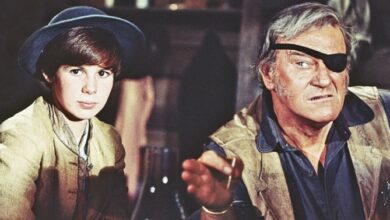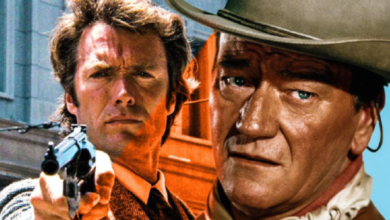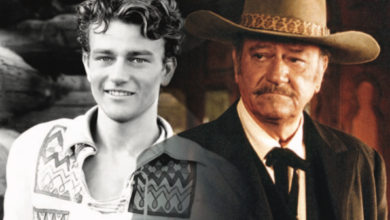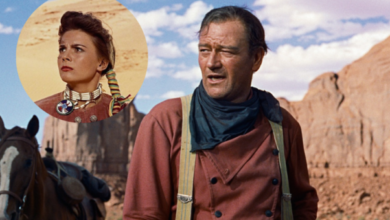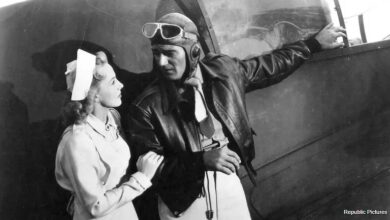Spend some time with The Duke before and after The Big Game.
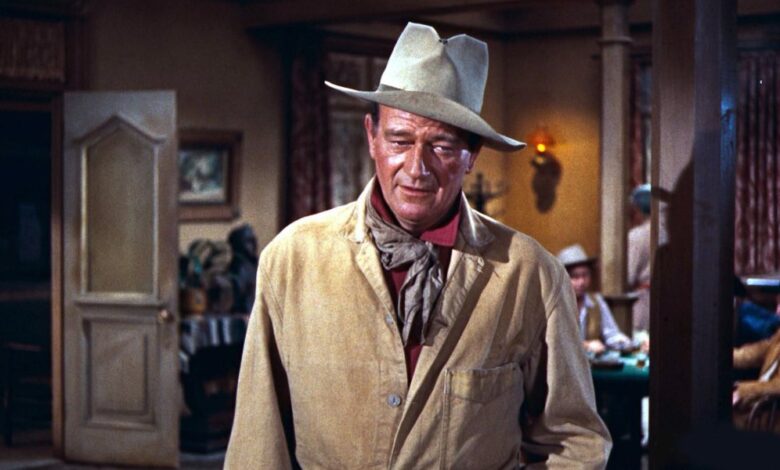
We could think of only one person who might be considered as important as football to many of our readers this weekend: John Wayne. So here are five movies starring The Duke available for streaming before or after the Super Bowl. Just click on the titles, and you’ll see where to find them.
Rio Bravo
Howard Hawks directed dozens of diverse movies — everything from musicals to war stories, gangster melodramas to screwball comedies — throughout a prodigious and prolific career that spanned from the silent era to the early ’70s. But Rio Bravo (1959) stands apart from his other certifiable masterpieces as a uniquely revered cult fave, one that elicits rapturous praise from fans and filmmakers alike. (Quentin Tarantino famously declared: “When I’m getting serious about a girl, I show her Rio Bravo, and she better bleeping like it.”) John Wayne, Dean Martin, Walter Brennan and Ricky Nelson are improbably but perfectly matched as the outgunned good guys who, in the true Hawksian tradition, remain true to personal codes of honor and duty — even as they grapple with limitations, weaknesses, inner demons, and really nasty hangovers —while bound together for a common purpose (in this case, keeping a killer behind bars while trying to avoid being killed).
The Sons of Katie Elder
As we noted in our 50th anniversary commemoration, this fan favorite was the first film Wayne made after his life-saving 1964 cancer operation: “Wayne remained every inch the thoroughgoing professional throughout the arduous production of The Sons of Katie Elder (1965), determined to prove that he had indeed ‘licked the Big C’ and was back in the saddle, literally as well as figuratively. If he ever resented [director Henry] Hathaway’s demanding drill-sergeant style of directing, he chose not to hold a grudge — and, just four years later, gladly re-teamed with the director for True Grit (1969), the movie for which he won his only Academy Award for Best Actor. Some biographers have theorized that The Sons of Katie Elder was an invaluable boon to John Wayne, in that it convinced him that working hard at what he did best was the way to continue cheating death. Such armchair psychology is usually of dubious value while taking the measure of any man. But in Wayne’s case — well, maybe there is something to the notion that there’s nothing like a brush with death to reignite one’s work ethic.”
El Dorado
If the plot of El Dorado (1967) seems a tad familiar, well it should — director Howard Hawks more or less recycled it from Rio Bravo (1959), and then re-recycled it for Rio Lobo (1970). But never mind: As often is the case with John Wayne westerns, the storytellers, not the story, are what really matter here. As critic Roger Ebert noted in his original review: “Wayne plays a professional gunman who comes to town to take a job from a rich rancher who wants a poor rancher’s water (who says the plot has to be original?). But the sheriff turns out to be his old buddy, [Robert] Mitchum, and so he turns down the job. Then the rich rancher hires another gunman (Christopher George), and Wayne sides up with the drunk and disheveled Mitchum. Duke’s team isn’t exactly made of heroes. Mitchum has been hitting the bottle for two months, his deputy (played with charm by [Arthur] Hunnicutt) is a windy old Indian fighter, Wayne has a bullet near his spine that causes a slight touch of paralysis now and again, and his sidekick ([James] Caan) is a kid who carries a shotgun instead of a pistol because he’s such a lousy shot. Hawks fashions scene after scene of quiet, earthy humor from this situation. Without great care, the movie could have degenerated into a put-on, but Hawks plays it straight and never allows his actors to take that last fatal step in overacting.” Movie buffs, take note: Listen closely, and you’ll hear a sly reference to Shoot the Piano Player, the 1962 film by Francois Truffaut, the great French filmmaker who, during his days as a critic, championed Hawks’ films long before many U.S. critics did.
Big Jake
When we asked Ethan Wayne back in 2007 to name his favorite of his famous father’s movies, he didn’t hesitate: “For me,” he said, “it’s Big Jake (1971), just because I was in it, my brother [Patrick Wayne] was in it, my other brother [Michael Wayne] produced it — and it gave me a chance to work with my dad.” Ethan played The Duke’s kidnapped grandson in the western drama, a gritty action flick directed by George Sherman that also featured Maureen O’Hara, Wayne’s longtime friend and frequent co-star, in a supporting role. “The crew that was on that movie, from the stuntmen and the caterers, they were all guys I grew up with,” Ethan Wayne recalled. “They were like my uncles. And the best thing about it was, I was there for just three weeks out of the filming — I was there for the entire filming. And it was the most fun a kid could have.”
The Shootist
On Jan. 22, 1901, legendary gunfighter J.B. Books (John Wayne) rides into Carson City, where a local doctor (James Stewart) confirms his worst fears: “You have a cancer. Advanced.” At the time of its release, The Shootist (1976) discomforted many fans who couldn’t help viewing it as an unwelcome reminder of The Duke’s real-life battles with “The Big C.” But now, decades after Wayne’s passing, this underrated western can be better appreciated as a respectful elegy for a Hollywood professional of tremendous dignity and stature. (A nice touch: The opening credits are flashed over clips from many of Wayne’s earlier westerns.) One might argue the film isn’t quite equal to the man it honors — but there’s no denying The Shootist allows Wayne one of his few opportunities to play a character who frankly expresses a fear of his own mortality (“I’m a dying man, a-scared of the dark!”) even while remaining true to his personal code: “I won’t be wronged. I won’t be insulted. I won’t be laid a hand on. I don’t do these things to other people, and I require the same from them.” Directed by Don Siegel, The Shootist is deeply moving as it symbolically ends an era of history and literally ends a historic screen career.

